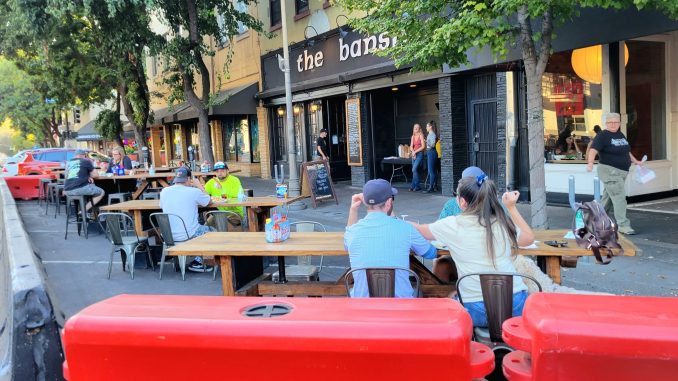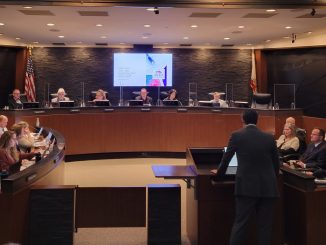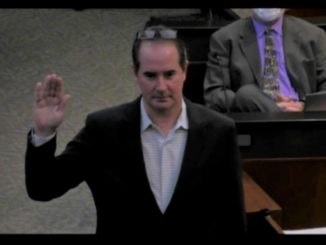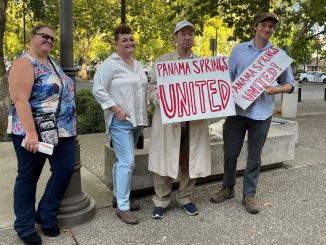
As the Chico City Council convened in closed session Tuesday evening (Oct. 18), diners downtown took advantage of the seasonable weather for a meal outside. At Momona and the Banshee, patrons enjoyed streetfront tables in the temporary parklets that sprang up during the height of the COVID-19 pandemic and continue to provide outdoor seating at establishments without curbside patios.
This option will vanish soon. During its brief open session, the council decided to let the dispensation for temporary parklets lapse when the city’s COVID emergency declaration ends (which was decided at the Oct. 4 meeting) on Dec. 1. Council members also started considering whether to rename Chico Municipal Airport.
The Oct. 4 action instructed staff to suggest how to proceed with a temporary ordinance to allow for parklets until the city could draft more comprehensive regulations. That dovetailed with recommendations from the council’s Internal Affairs Committee, which received input from three of the seven businesses utilizing temporary parklets.
Tuesday, the council switched directions. Deputy City Manager Jennifer Macarthy discussed logistics of quickly drafting a temporary ordinance, only to later pivot to a second ordinance on the same matter. Meanwhile, public speaker Greg Scott pointed to Gov. Gavin Newsom’s announcement the previous day that the state would end its emergency declaration Feb. 28, 2023, which would impact alcohol service to parklets. (Interim Police Chief Billy Aldridge there’s a one-year grace period before a ban would resume.)
Finally, Audrey Taylor, representing the Downtown Chico Business Association, told the council that restaurateurs and retailers preferred an “aesthetic downtown” with better-designed parklets—as well as parking freed up. Macarthy had explained that the seven temporary parklets cover 26 spaces while nine permanent sidewalk patios take up 16 spaces.
Only Duffy’s Tavern owner Doug Roberts, whose building has temporary parklets along Main and Fourth streets, advocated for preserving the status quo for now. Surrounded by traffic barriers, they’re “definitely an eye sore as-is,” he acknowledged but noted Chico has “examples from different cities” upon which to draw.
Those examples may edify broader consideration. Councilman Sean Morgan made a motion to let the temporary parklets lapse and for the Internal Affairs Committee to discuss how future permanent parklets should look. Councilman Mike O’Brien seconded, and it passed 5-2, with Mayor Andrew Coolidge and Councilwoman Alex Brown in dissent. Brown cited this action’s roots in rescinding the emergency declaration, which she’d opposed; Coolidge said the potential for temporary parklets through February 2024 merited examination.
“I don’t mind the parklets staying, just obviously want them more aesthetically pleasing,” Coolidge told the CN&R afterward, “but it doesn’t sound like the city has a process that can move through that faster. We need an official way to make this look better, but it’s going to take a few months, which is reasonable.
“Hopefully it can go back to Internal Affairs, get back to the council fairly quickly, hopefully by December where maybe they can have a two-month process, a three-month process … and move forward and have this until 2024. I’m not sure my colleagues will agree with that.”
Macarthy’s staff presentation estimated six to nine months for developing a comprehensive ordinance, which (along with the wording of Morgan’s motion) seemingly would preclude temporary parklets from the scope of discussion.
“I think Internal Affairs, when they go through this, can in fact bring that back up,” Coolidge replied. “Whereas I’d like to see that happen, I’m not so sure it will.”
Airport name
In the hour’s other significant item of business, the council addressed a request from Coolidge to discuss the airport’s identity. Airport commissioners, a stakeholder group and Chico State marketing students concluded that a name that’s regional versus civic better reflects the “catchment area” from which a commercial airline would draw, thereby enhancing the appeal to a potential carrier and customers.
Public Works Director Erik Gustafson, whose division oversees Chico Municipal Airport, noted that Redding recently changed the name of its field to Redding Regional Airport. Chico’s catchment area includes Butte, Glenn and part of Tehama county. The city hired a marketing firm as part of a rebranding effort coinciding with the push to land air service.
Without revealing potential names, Coolidge made a motion for staff to seek input on the list from the marketing firm and marketing students, then return with suggestions at the next council meeting (Nov. 1). It passed 6-1, with Brown dissenting.
“Really, this is just another piece of the puzzle as we move forward on the airport,” Coolidge said. “We have new taxiways now, which cost literally millions of dollars, which was a federal grant. We have the [Department of Transportation] grant of $500,000 towards our revenue guarantee fund [for an airline]. We have a new roadway that’s been built, Cohasset Road—needed to be done anyway, part of a grant program, also helps in getting people out to the airport.
“So we have all these things that have come together and will help us in our conversations with the airlines. Some people will think an airline will come when the business is ready. When you have a business that is more structured to having infrastructure in place, ease of exit and entry, it’s not simply because the economy is ready. That’s really what we’re getting toward.”




Be the first to comment